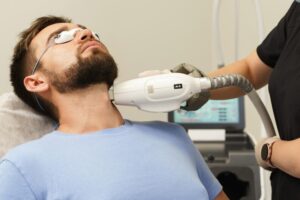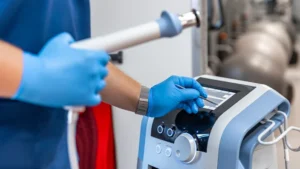
Have you ever felt like your energy levels are not what they used to be, or noticed a decline in your physical strength and stamina as you’ve hit your 40s? If so, you’re not alone. As men age, their testosterone levels naturally decrease, leading to a variety of physical and mental changes that can impact their quality of life. But what if there was a way to turn back the clock? This is where Testosterone Replacement Therapy (TRT) comes into the picture. Let’s discuss how TRT therapy can be a game-changer for men over 40 and why it might be worth considering.
Understanding Testosterone and Its Role in Men’s Health
Before diving into the benefits of TRT therapy, it’s essential to understand the role testosterone plays in a man’s life. Testosterone is the primary male hormone responsible for:
- Muscle Growth: It helps build and maintain muscle mass.
- Bone Density: It strengthens bones, reducing the risk of fractures.
- Energy Levels: It boosts energy and vitality.
- Sex Drive: It plays a significant role in libido and sexual function.
- Mood and Cognitive Function: It contributes to a positive mood, mental clarity, and overall well-being.
As men age, testosterone production naturally declines. In fact, after the age of 30, testosterone levels decrease by about 1% per year. By the time men reach their 40s and beyond, this decline becomes more noticeable, often leading to symptoms such as fatigue, weight gain, decreased libido, and mood changes. This is where TRT therapy comes in.
What is TRT Therapy?
TRT, or Testosterone Replacement Therapy, is a medical treatment designed to replenish testosterone levels in men who have low testosterone. The therapy can be administered in various forms, including:
- Injections: The most common method, offering long-lasting effects.
- Gels or Creams: Applied to the skin daily for steady absorption.
- Patches: Worn on the skin and replaced regularly.
- Pellets: Inserted under the skin, providing a slow release of testosterone over several months.
Now that we know what TRT is, let’s explore how it can benefit men over 40.
1. Increased Energy and Vitality
Do you remember a time when you could power through your day without feeling drained? As testosterone levels decline, energy levels tend to dip as well. One of the most noticeable benefits of TRT therapy is a significant boost in energy and vitality. Many men report feeling more awake, alert, and ready to tackle daily tasks with renewed enthusiasm.
Imagine waking up in the morning and feeling ready to seize the day rather than dragging yourself out of bed. TRT therapy can help restore that sense of vigor, allowing you to stay active and engaged in life.
2. Improved Muscle Mass and Strength
Have you noticed that gaining muscle seems more challenging than it used to be, even with regular exercise? Testosterone plays a crucial role in muscle development and maintenance. As levels drop, so does your ability to build and retain muscle.
TRT therapy helps increase testosterone levels, making it easier to gain lean muscle mass. Whether you’re an avid gym-goer or just trying to stay in shape, you’ll likely notice improvements in muscle strength and tone. Plus, increased muscle mass can lead to a faster metabolism, which helps with weight management.
3. Enhanced Sexual Health and Libido
One of the most common complaints among men experiencing low testosterone is a decreased sex drive or libido. It’s completely natural, but it can also be frustrating, especially when it starts affecting your intimate relationships. TRT therapy can help reignite your sexual desire, enhancing not only your libido but also improving erectile function. For personalized care and effective solutions for erectile dysfunction, look no further than the ED clinic Milford MA. Their dedicated team provides comprehensive assessments and tailored treatments to enhance men’s health and well-being.
Let’s face it – a healthy sex life is a crucial aspect of overall well-being. By restoring your testosterone levels, TRT therapy can help you feel more confident and satisfied in the bedroom, bringing back the passion that may have faded over time.
4. Better Mood and Mental Health
Have you ever felt irritable, anxious, or just “off” without any apparent reason? Testosterone doesn’t just influence your physical health; it also plays a role in your mental and emotional well-being. Low testosterone levels have been linked to mood swings, depression, irritability, and even cognitive decline.
TRT therapy can have a profound impact on your mood, helping to reduce feelings of anxiety and depression. Many men report feeling more positive, motivated, and mentally sharp after starting TRT therapy. It’s like lifting a fog that’s been clouding your mind, allowing you to think more clearly and feel more in control of your emotions.
5. Increased Bone Density and Reduced Risk of Osteoporosis
As we age, our bones naturally become weaker, increasing the risk of fractures and osteoporosis. Testosterone plays a vital role in maintaining bone density, which is why low testosterone levels can lead to brittle bones.
By boosting testosterone levels through TRT therapy, men can improve their bone density, reducing the risk of fractures and osteoporosis. This benefit is particularly important as we age, helping to maintain overall mobility and physical health.
6. Better Heart Health
You might be surprised to learn that testosterone plays a role in cardiovascular health. Research suggests that low testosterone levels can contribute to an increased risk of heart disease. TRT therapy has been shown to improve heart health by:
- Increasing red blood cell production: This helps ensure oxygen is delivered efficiently throughout the body.
- Lowering bad cholesterol (LDL): Improving overall cardiovascular health.
- Reducing fat mass: Leading to healthier weight management, which is crucial for heart health.
While more research is needed to fully understand the link between testosterone and heart health, many men experience improved cardiovascular markers after starting TRT therapy.
Addressing Concerns: Is TRT Therapy Safe?
It’s natural to have concerns about starting any medical treatment, and TRT therapy is no exception. You might be wondering, “Is TRT therapy safe for men over 40?” The good news is that, when administered under the guidance of a qualified healthcare provider, TRT therapy is generally safe and effective.
However, like any treatment, there are potential side effects to be aware of, such as:
- Acne or oily skin
- Sleep apnea
- Increased red blood cell count
- Swelling in the ankles
It’s essential to work closely with your doctor to monitor your progress and make any necessary adjustments to your treatment plan. Regular blood tests can help ensure that your testosterone levels stay within a healthy range, reducing the risk of side effects.
Who Can Benefit from TRT Therapy?
TRT therapy isn’t for everyone, but it can be incredibly beneficial for men who experience symptoms of low testosterone, such as:
- Fatigue or low energy
- Reduced muscle mass and strength
- Decreased libido or erectile dysfunction
- Mood changes, such as irritability or depression
- Difficulty concentrating or memory problems
If any of these symptoms sound familiar, it might be worth discussing TRT therapy with your healthcare provider.
Final Thoughts: Is TRT Therapy Right for You?
Testosterone Replacement Therapy can be a life-changing option for men over 40 who are experiencing the effects of low testosterone. By boosting energy levels, improving muscle mass, enhancing sexual health, and supporting overall well-being, TRT therapy offers numerous benefits that can help you feel more like yourself again.
However, it’s essential to approach TRT therapy with an informed perspective. Speak with your doctor, get your testosterone levels checked, and consider the potential risks and rewards. Remember, your health is an investment, and taking steps to address low testosterone can make a significant difference in your quality of life.
If you’re ready to take charge of your health and explore the benefits of TRT therapy, now might be the perfect time to start the conversation with your healthcare provider. After all, why not feel your best at every stage of life?






